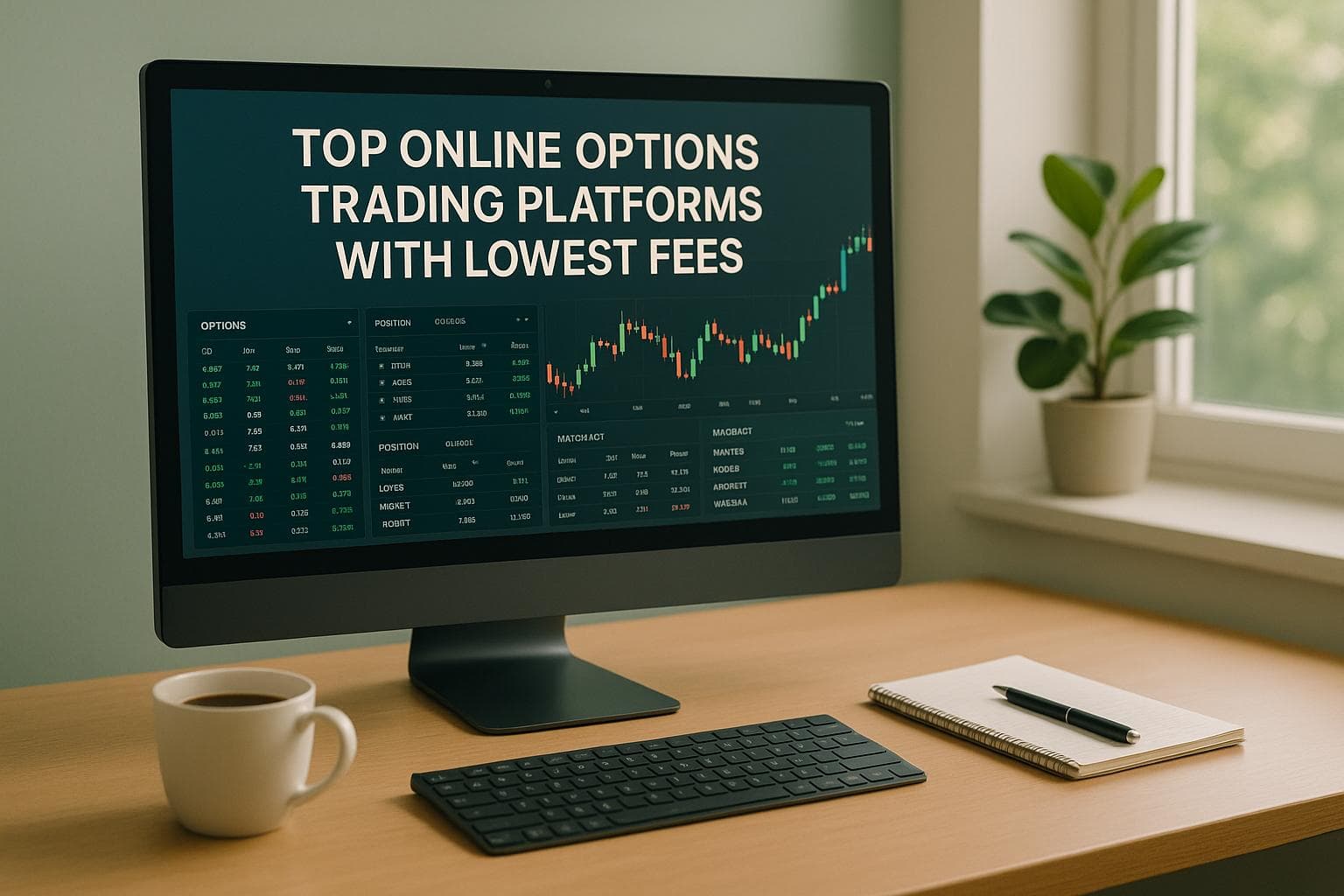Looking for an affordable options trading platform? Here’s a quick guide to the best platforms that combine low fees with reliable tools for U.S. traders. Whether you’re a beginner or an experienced trader, the right platform can save you money while offering the features you need to succeed.
Key Takeaways:
- Interactive Brokers: Best for high-volume traders with advanced tools. Fees: $0.65/contract.
- Fidelity: Great for balanced traders, with strong research and $0.65/contract fees.
- E*TRADE: Ideal for active traders, offering powerful tools and $0.65/contract fees.
- Webull: Budget-friendly, modern interface, and $0.55/contract fees.
- SoFi Active Investing: Perfect for beginners with simple tools and $0.50/contract fees.
Quick Comparison:
| Platform | Best For | Options Fee | Key Features |
|---|---|---|---|
| Interactive Brokers | High-volume traders | $0.65/contract | Advanced tools, low fees |
| Fidelity | Balanced traders | $0.65/contract | Strong research, easy-to-use |
| E*TRADE | Active traders | $0.65/contract | Reliable execution, robust tools |
| Webull | Budget-conscious | $0.55/contract | Modern design, low costs |
| SoFi Active Investing | Beginners | $0.50/contract | Simple tools, low-cost entry |
These platforms strike a balance between affordability and functionality, with options for every trading style. Choose the one that aligns with your goals and trading volume.
Options Trading Apps Best to Worst
1. Interactive Brokers
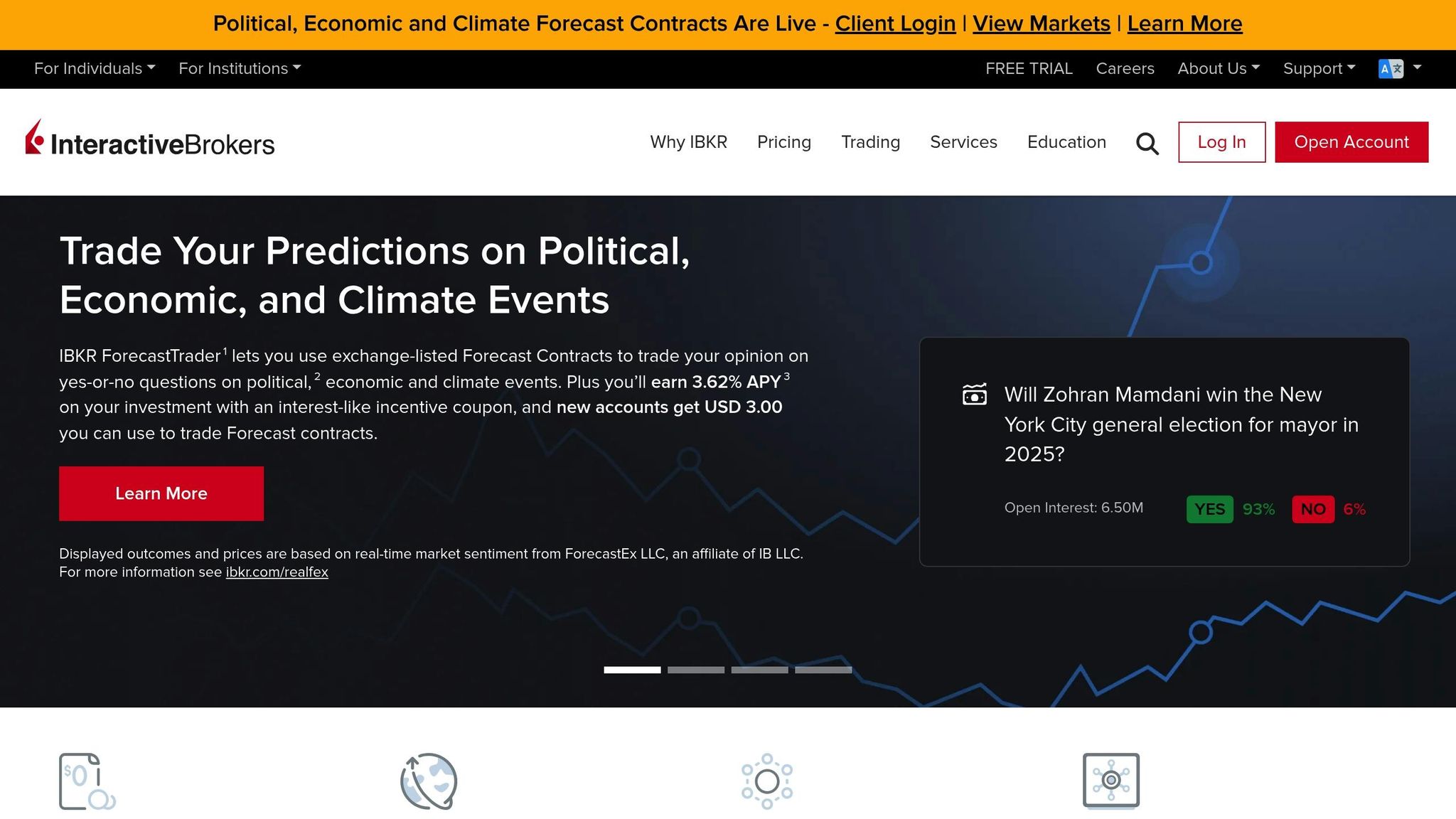
Interactive Brokers stands out as a go-to platform for serious options traders, offering a mix of low fees and advanced trading features. Its pricing models are designed to cater to different trading volumes, making it especially appealing to those executing a high number of contracts. For smaller accounts, activity fees may apply, but these costs can be offset by higher trading activity.
Fee Structure
Interactive Brokers offers flexible pricing tiers, allowing traders to select a model that suits their approach. Whether you prefer commission-free stock trades paired with straightforward options pricing or a plan tailored for high-volume trading, the platform’s fee structure is designed to match a variety of needs. These pricing options are complemented by an array of advanced trading tools, making it a versatile choice for different trading styles.
Trading Tools
The Trader Workstation (TWS) platform provides a powerful suite of tools for options trading. Its options chain delivers key metrics and real-time data, while the integrated Strategy Builder allows traders to create complex, multi-leg strategies with real-time profit and loss projections. The Portfolio Analyst evaluates risk under different scenarios, and the OptionTrader interface simplifies order entry with one-click functionality. These tools work together to enhance trading efficiency and profitability.
Platform Reliability
Interactive Brokers operates on a highly reliable infrastructure capable of managing large trading volumes and intense market activity. This stability ensures smooth performance, even during volatile market conditions.
Hardware Compatibility
Trader Workstation is compatible with both Windows and macOS systems, offering multi-monitor support for an enhanced trading experience. For traders on the go, the mobile apps for iOS and Android provide access to the platform’s full suite of tools, making it easy to monitor and manage positions from virtually anywhere.
2. Fidelity

Fidelity takes the spotlight with its commitment to reducing trading costs while maintaining cutting-edge technology. Offering zero-commission options trading, the platform blends affordability with strong features, making it appealing to both beginners and seasoned investors. Its focus on cost-effective trading has earned it recognition across the industry.
Fee Structure
Fidelity stands out with its $0 commissions and a $0.65 contract fee per options trade. For online U.S. stock, ETF, and options trades in retail accounts, there are no commissions. Options traders pay a $0.65 fee per contract on all online options trades, and buy-to-close orders costing $0.65 or less are commission-free. However, an Options Regulatory Fee applies to both buying and selling options, and this fee may vary.
For traders employing more complex strategies – like spreads, straddles, or collars – costs can add up due to the per-contract fee structure. Fidelity also ensures accessibility by requiring no account minimums and charging no account service fees, making it a viable choice for traders with varying budgets.
When it comes to margin trading, Fidelity offers competitive rates. For debit balances exceeding $1,000,000, rates are as low as 8.00%, while the base margin rate currently stands at 11.075% as of September 19, 2025. This straightforward pricing pairs well with the platform’s robust trading tools.
Trading Tools
Fidelity enhances its low-cost structure with a suite of powerful trading tools designed for efficiency and informed decision-making. The platform offers an options chain interface packed with essential metrics, helping traders analyze pricing and execute strategies effectively. Advanced order types support sophisticated trading approaches, while integrated research tools cater to both fundamental and technical analysis needs.
Active Trader Pro, Fidelity’s desktop application, takes things further with advanced charting options and superior order management features tailored for active traders. For those on the move, Fidelity’s mobile apps provide full trading functionality, allowing users to monitor and adjust their positions anytime, anywhere.
Hardware Compatibility
Fidelity’s trading platforms are designed to work seamlessly across various devices. The web-based platform functions on standard web browsers for Windows and macOS users. The Active Trader Pro desktop application is specifically available for Windows systems. For mobile users, Fidelity’s iOS and Android apps ensure full trading capabilities are always at hand.
3. E*TRADE
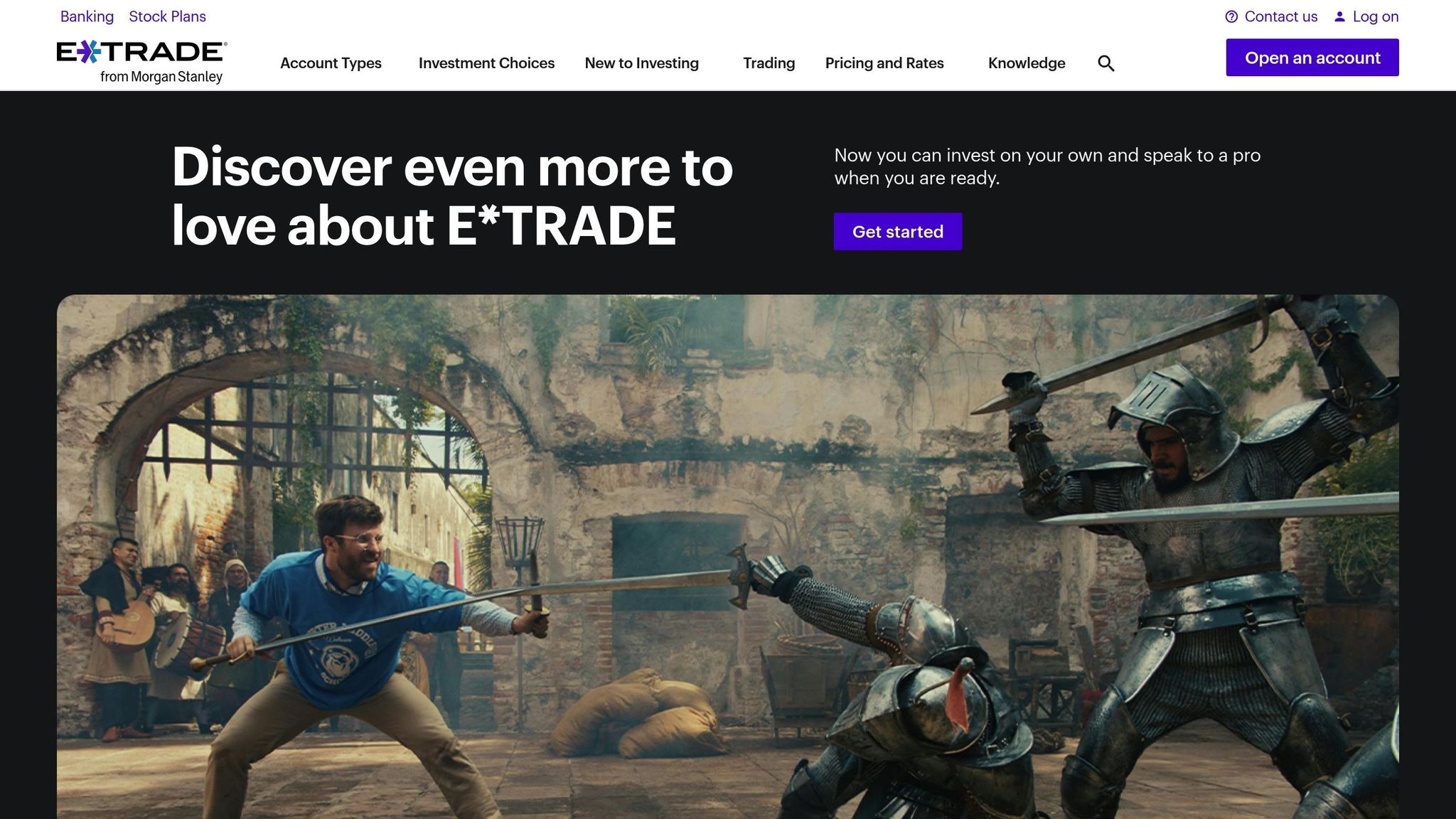
E*TRADE blends competitive pricing with advanced tools designed for options trading. With commission-free trading on U.S. stocks and ETFs and a reasonable per-contract fee for options, it caters to both casual and active traders aiming to keep costs manageable while pursuing their strategies.
Fee Structure
E*TRADE’s pricing structure includes a straightforward per-contract fee, helping traders predict their overall costs. The platform also supports margin trading, with rates that vary depending on account size – be sure to check the latest rates. There’s no minimum balance required to open an options trading account, but beginners must complete an application to assess their trading experience and risk tolerance. Keep in mind that additional charges, such as regulatory fees or fees for assignments and exercises, may apply. These costs are essential to consider when planning your trading approach.
Trading Tools
The Power E*TRADE platform is packed with features tailored for options traders. It offers advanced charting tools, comprehensive order management, and a detailed options chain display with real-time analytics like Greeks, implied volatility, and volume stats. The integrated Strategy Scanner helps identify opportunities by filtering for criteria such as volatility, expiration dates, and profit potential. For deeper analysis, the OptionsHouse integration provides tools like probability analysis and profit/loss visualizations, enabling traders to test complex strategies before committing funds. E*TRADE’s mobile apps for iOS and Android also deliver full options trading capabilities, including real-time quotes, advanced order types, and detailed portfolio tracking.
Platform Reliability
E*TRADE’s infrastructure is built for reliability. Its distributed architecture and smart order routing ensure trades are executed at the best available prices, even in rapidly changing markets. Real-time data feeds from major options exchanges and backup systems ensure uninterrupted market access, even if a primary feed experiences issues.
Hardware Compatibility
E*TRADE’s web-based platform works seamlessly across Windows, macOS, and Linux through popular browsers like Chrome, Firefox, and Safari, without compromising functionality. For those who prefer dedicated software, the Power E*TRADE desktop application supports both Windows and macOS, offering enhanced performance and multi-monitor support. The platform also shines in mobile compatibility, with apps that provide a consistent experience across devices. For algorithmic traders, E*TRADE offers API access to integrate its services with custom systems or third-party applications. Note that API access requires separate approval and may involve additional fees.
sbb-itb-24dd98f
4. Webull
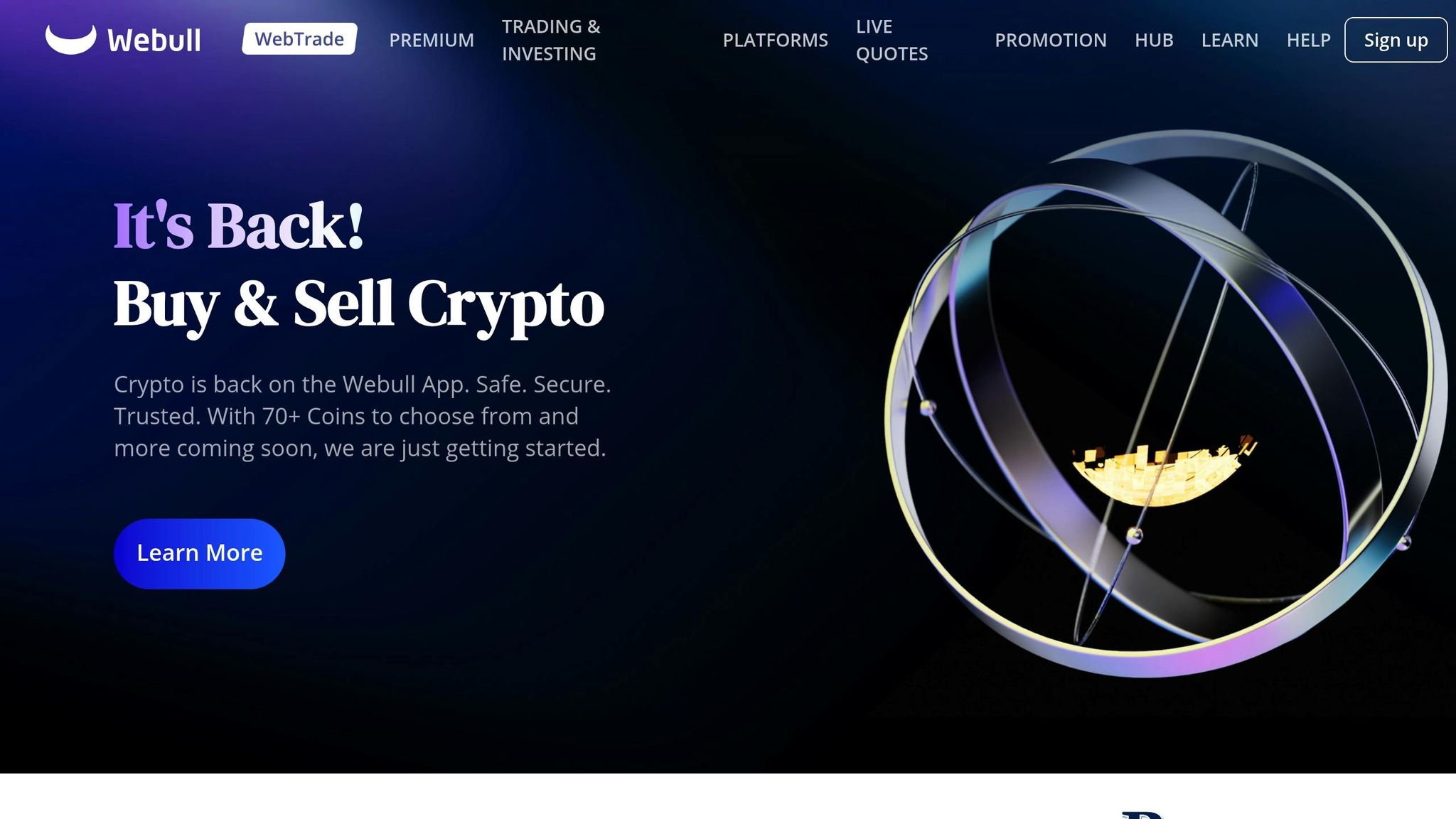
Webull stands out as a budget-friendly option for options traders, joining the ranks of platforms like Interactive Brokers, Fidelity, and E*TRADE. Its appeal lies in offering commission-free stock and ETF trades alongside competitive pricing for options. For traders seeking advanced charting tools without breaking the bank, Webull has become a go-to choice.
Fee Structure
Webull keeps costs low with a minimal per-contract fee and no account minimums. While traders need to complete an options application and meet suitability standards, the platform avoids maintenance or inactivity fees, making it a practical choice for those with irregular trading patterns. Standard assignment and exercise fees apply, and margin rates depend on account size. Regulatory fees are passed on at cost, ensuring transparency. These cost-effective features pair well with the platform’s robust trading tools.
Trading Tools
Webull equips traders with a comprehensive suite of tools tailored to options trading. The platform includes advanced charting capabilities, a wide range of technical indicators, and customizable watchlists featuring live options data. Its options chain interface is user-friendly, showcasing key metrics like Greeks, volatility, and open interest.
For those looking to hone their skills, Webull offers a paper trading simulator that uses live market data, allowing users to test strategies without risking real money. Advanced order types, such as multi-leg strategies, stop-loss, and bracket orders, are also available. Additionally, the built-in screener helps identify opportunities based on criteria like unusual trading volume or specific technical patterns.
Webull’s mobile app mirrors the functionality of its desktop platform, enabling traders to manage even complex options positions while on the move. Push notifications keep users updated on price changes, earnings reports, and other significant market events.
Platform Reliability
Webull’s infrastructure is designed to handle high trading volumes efficiently. The platform regularly upgrades its server capacity and redundancy to ensure reliability. Smart order routing enhances execution by seeking price improvements, while real-time Level II market data – offered at no extra cost – gives traders a deeper look into market dynamics, like order book depth and potential support or resistance levels. Backup data feeds further ensure uninterrupted access during connectivity issues.
Hardware Compatibility
Webull is accessible through standard web browsers on Windows, macOS, and Linux systems. For a more tailored experience, dedicated desktop applications are available for Windows and macOS users, offering customizable layouts that can span multiple monitors. This allows traders to simultaneously monitor charts, options chains, and portfolio positions.
Mobile apps for iOS and Android provide full functionality, making it easy to trade on the go. For algorithmic traders, Webull offers API access, though this requires additional approval and documentation.
5. SoFi Active Investing
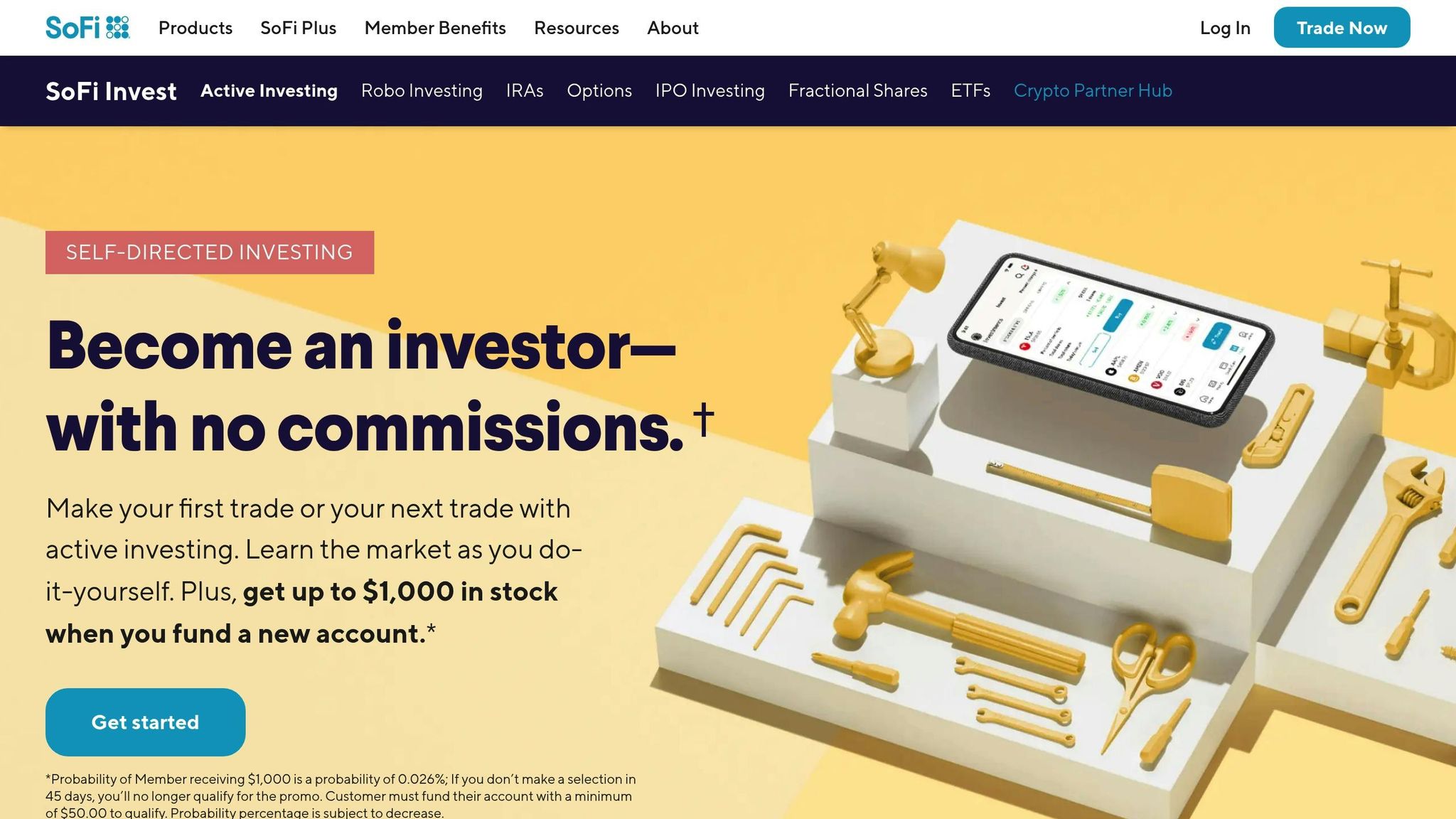
SoFi Active Investing provides a straightforward, budget-friendly platform for options trading, particularly appealing to beginners. Its fee structure and accessible tools make it a great starting point for those new to investing.
Fee Structure
SoFi Active Investing keeps costs low, especially for casual traders. The platform offers commission-free trading for stocks and ETFs, along with low options contract fees, making it affordable for those who trade occasionally. There are no account maintenance fees or minimum balance requirements, which means you can dive into options trading without worrying about upfront costs. This setup is ideal for low-volume traders looking for a simple, cost-effective way to get started.
Trading Tools
The platform’s trading tools are designed with simplicity in mind. SoFi offers options chains that display essential details like bid–ask spreads, trading volume, and expiration dates. Additionally, it provides educational resources to help users understand key concepts, such as the Greeks and implied volatility. While these features are great for beginners, seasoned traders might find the tools limiting if they’re looking for advanced analytics or support for complex, multi-leg strategies.
Platform Reliability
SoFi performs reliably for standard options trades during regular market hours. However, it doesn’t include advanced routing features, which might be a drawback for high-frequency or professional traders.
Hardware Compatibility
You can access SoFi Active Investing through web browsers on Windows and macOS, as well as through its mobile apps for iOS and Android. The platform emphasizes ease of use and runs smoothly even on basic hardware. That said, it doesn’t offer advanced desktop features like multiple monitor setups or API access for algorithmic trading, which might matter to more tech-savvy investors.
Platform Advantages and Disadvantages
When it comes to options trading, finding the right balance between cost and functionality is essential. Different platforms cater to different trading styles, offering their own mix of fees, tools, and support. Here’s a breakdown of some popular platforms to help you decide which one might suit your needs best.
Interactive Brokers is a favorite among experienced traders who value low fees and advanced tools. It supports complex, multi-leg strategies and works well for traders handling large volumes. However, beginners might find its steep learning curve and higher minimum account requirements a bit daunting.
Fidelity offers a well-rounded option, combining competitive fees with an easy-to-use interface, strong research tools, and plenty of educational resources. That said, its advanced features fall short compared to platforms tailored for active trading, and its execution speeds can sometimes lag.
E*TRADE is designed with active traders in mind, featuring a powerful desktop platform and a full suite of options tools. Its reliable performance during volatile market periods is a standout feature. On the downside, its fee structure might not appeal to traders with extremely high volumes, and the mobile app doesn’t quite match the polish of its desktop counterpart.
Webull attracts budget-conscious traders with commission-free stock trading, competitive options pricing, and a sleek, modern interface. It’s particularly popular with younger traders who appreciate its digital-first approach. However, it offers fewer research tools and limited support, which could be a drawback for some.
SoFi Active Investing is ideal for beginners, thanks to its commission-free stock trades and low options fees. Its simple, user-friendly interface makes it easy to get started, but it lacks the advanced tools needed for more sophisticated trading strategies.
Here’s a quick comparison of the platforms’ key features:
| Platform | Best For | Key Advantage | Main Challenge | Options Fee |
|---|---|---|---|---|
| Interactive Brokers | Professional traders | Low costs and advanced trading tools | Steep learning curve and higher minimums | $0.65/contract |
| Fidelity | Balanced traders | Strong research and easy-to-use design | Limited advanced features | $0.65/contract |
| E*TRADE | Active traders | Reliable execution and robust tools | Less appealing for very high-volume traders | $0.65/contract |
| Webull | Cost-conscious traders | Modern interface and tech-friendly features | Limited research tools and support | $0.55/contract |
| SoFi Active Investing | Beginners | Simple, low-cost entry | Basic tools and minimal support | $0.50/contract |
Beyond fees and tools, consider how each platform’s interface fits your trading setup. For example, Interactive Brokers and E*TRADE excel with desktop applications that support multi-monitor setups and high-speed trading. In contrast, Fidelity, Webull, and SoFi focus more on web and mobile experiences, making them better suited for traders on the go.
Customer support is another factor to weigh. Fidelity and E*TRADE offer dedicated phone support with knowledgeable representatives, which can be invaluable if you prefer immediate, personalized assistance. On the other hand, platforms like Interactive Brokers, Webull, and SoFi rely more on digital channels such as chat and email, which might work better for traders comfortable with less direct interaction.
Conclusion
Finding the right options trading platform means striking a balance between affordability and the tools needed for your specific trading approach. For beginners or those focusing on low-cost trading, SoFi Active Investing is a great choice thanks to its minimal fees. On the other hand, Interactive Brokers and E*TRADE cater to more seasoned traders, offering richer features and advanced tools, albeit at slightly higher costs.
Interactive Brokers is particularly appealing to professional traders who handle complex multi-leg strategies and need sophisticated analytical tools. Its robust execution capabilities and advanced features make it a standout option. Meanwhile, E*TRADE shines for its reliability during volatile markets and its powerful desktop trading tools, which are designed to enhance the experience of active traders.
For those seeking a middle ground, Fidelity offers competitive pricing alongside excellent research tools, while Webull provides a sleek and modern interface that’s easy to navigate.
However, choosing the right platform is only part of the equation. Your trading performance also heavily relies on your hardware. High-performance systems with ultra-low latency, the ability to handle multiple data streams, and real-time options chain displays are critical for executing trades quickly and efficiently. Platforms perform at their best when paired with computers equipped with fast processors, ample RAM, and multi-monitor setups, ensuring you can react swiftly in fast-moving markets.
Professional traders know that milliseconds can make all the difference, especially during pivotal market events. A well-optimized trading computer allows you to maximize the capabilities of your platform, giving you an edge in capturing rapid price movements.
Ultimately, combining a cost-effective trading platform with reliable, high-performance hardware is key to staying competitive and seizing every opportunity the market offers.
FAQs
What should I look for in an options trading platform besides low fees?
When choosing a platform for options trading, it’s important to look beyond just low fees. A user-friendly interface and powerful trading tools can significantly improve your overall experience. Features like real-time market data, advanced charting tools, and customizable layouts can provide the insights and flexibility you need to make smarter trading decisions.
Don’t overlook the importance of customer support either. Having access to dependable assistance can be a lifesaver if you run into technical issues or need quick answers. Also, consider whether the platform offers educational resources and research tools. These can help you sharpen your skills and refine your trading strategies, giving you the confidence to navigate the market more effectively.
How can the tools on these trading platforms improve my options trading strategy?
Many trading platforms come equipped with advanced tools to help you fine-tune and execute your options trading strategies with greater precision. Take real-time net greeks, for example – they give you instant updates on key metrics like directional exposure and volatility risk, making it easier to manage potential risks as market conditions shift.
Another handy feature is interactive options chains, which simplify the process of building more intricate trades, such as spreads, directly on the platform. On top of that, some platforms offer strategy builders to help you choose strategies that align with your market outlook. Tools like risk navigators and smart order routing further assist in optimizing trade execution and keeping risks in check. Altogether, these tools can streamline your decision-making process and make your trading experience more efficient.
Are there any extra fees I should know about when using these options trading platforms?
Yes, there are extra costs to consider when trading options. These include regulatory and exchange fees, which brokers pass along to their customers. For instance, the Options Regulatory Fee (ORF) is $0.02135 per contract, while the Options Clearing Corporation (OCC) imposes a clearing fee of $0.02 per contract, with a maximum of $55 per trade.
Additionally, some brokers may charge fees for option exercises and assignments. It’s a good idea to carefully review your broker’s fee schedule to avoid surprises. Being aware of these charges can help you keep your trading expenses in check and improve your overall profitability.
